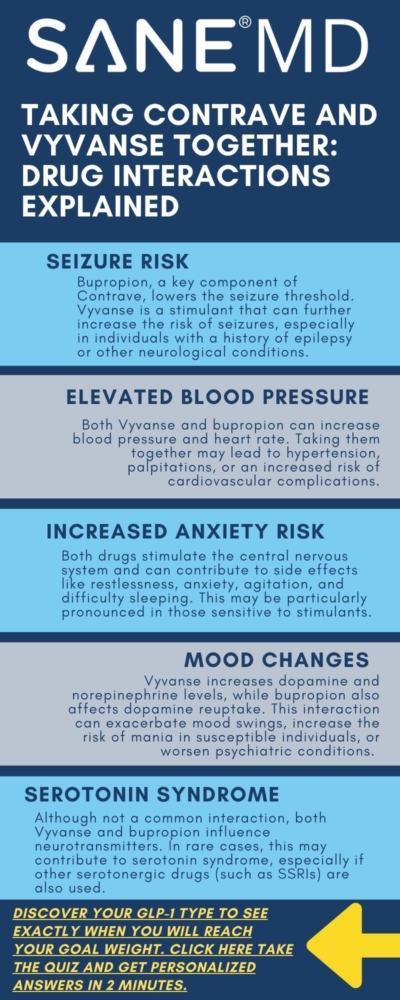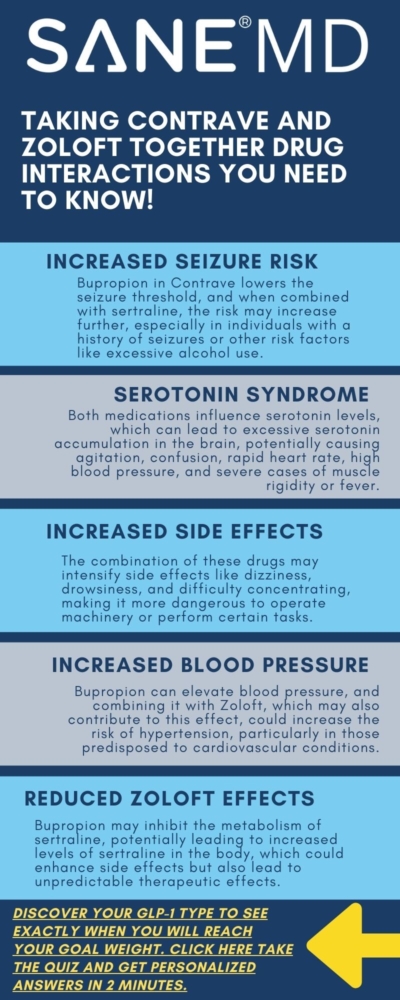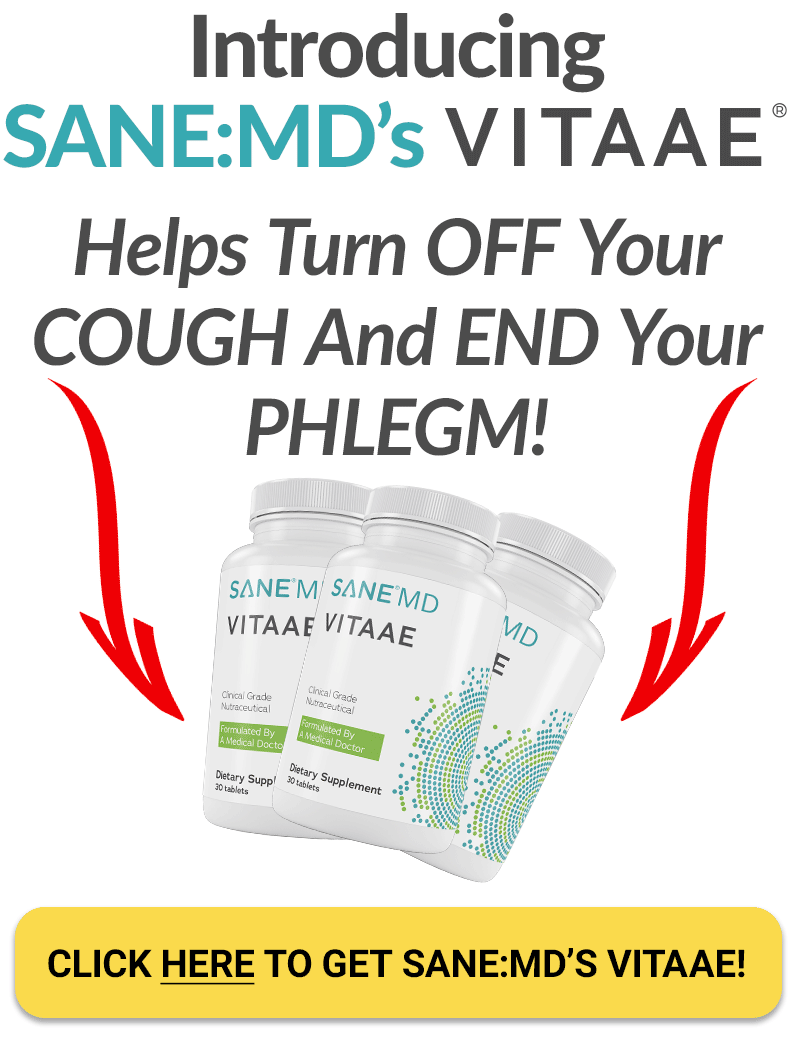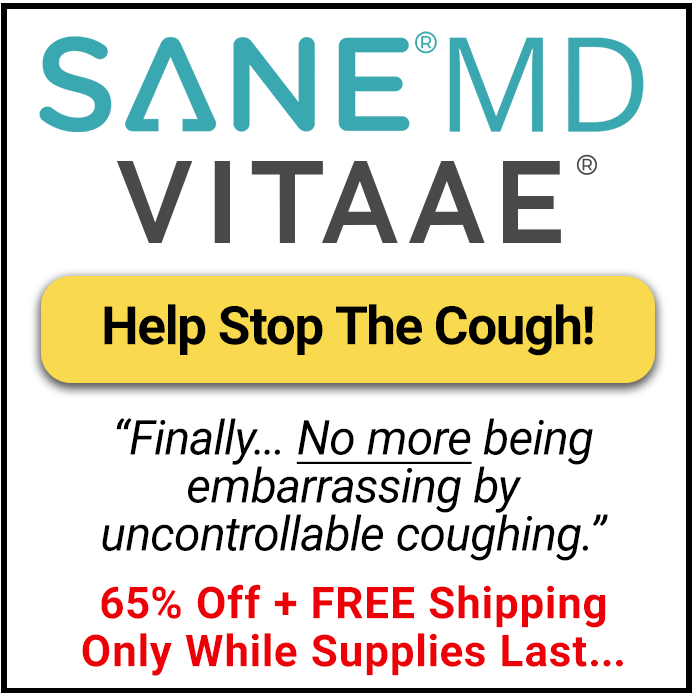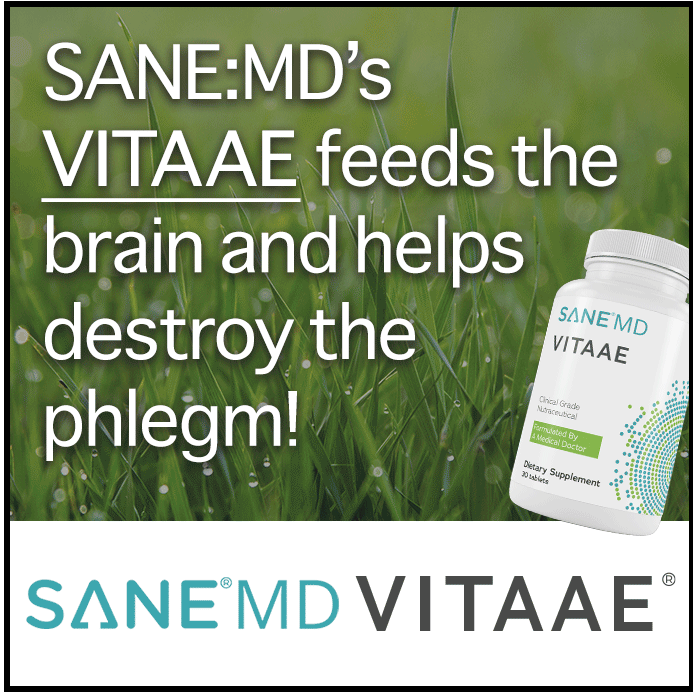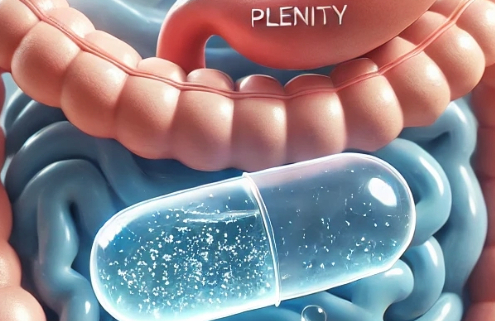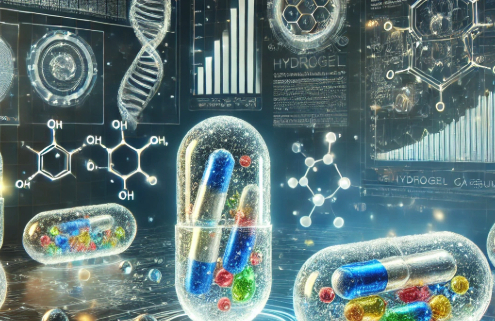Contrave and Vyvanse Together: Drug Interactions Explained

When combining Contrave and Vyvanse together: drug interactions can occur. This is a concern, particularly because of their impact on blood pressure, serotonin syndrome, and other health risks.
Understanding how both medications influence the central nervous system is crucial for safety. This article explores the risks of taking Contrave and Vyvanse together.
Key Takeaways
- Taking Vyvanse with Contrave can increase the risk of high blood pressure, serotonin syndrome, and other complications.
- Both drugs affect mental health conditions and may interact with certain medications like selective serotonin reuptake inhibitors and tricyclic antidepressants.
- Always tell your doctor about any other medications, nutritional supplements, or over-the-counter drugs before combining these prescriptions.
What is Contrave?
Contrave is a weight loss drug that combines bupropion hydrochloride and naltrexone, two active ingredients that work together to support weight management.
It is primarily prescribed for compatible individuals with obesity or those who are overweight with additional health conditions such as high blood pressure, type 2 diabetes, or high cholesterol.
Contrave is intended to be used alongside a low-calorie diet and regular exercise to promote sustainable weight loss.
How Contrave Works
Contrave’s dual-action formula influences the central nervous system, specifically targeting areas of the brain that regulate cravings, appetite, and reward responses to food.
- Bupropion hydrochloride is an antidepressant that affects dopamine and norepinephrine levels. Originally developed to treat depression, it is also used in smoking cessation treatments due to its ability to reduce cravings. In Contrave, it helps control food-related urges and emotional eating.
- Naltrexone is an opioid antagonist that blocks opioid receptors in the brain. It is typically used in addiction treatment to reduce the effects of opioids and alcohol. In Contrave, naltrexone reduces the brain’s reward response to food, making overeating less satisfying.
Potential Risks and Warnings
Contrave carries a boxed warning that alerts doctors about serious mental health effects due to bupropion hydrochloride. This medication has been linked to an increased risk of suicidal thoughts in young adults, similar to other antidepressants.
Individuals with bipolar disorder may experience worsening mood symptoms, including mania or depression when taking Contrave. The drug may also interact with certain drugs used to treat mental health conditions, such as:
- Selective serotonin reuptake inhibitors (SSRIs)
- Tricyclic antidepressants
- Other medications for mood stabilization or psychiatric disorders
Additionally, Contrave should be used with caution in individuals with high blood pressure, as bupropion hydrochloride may lead to elevated blood pressure and increased heart rate. See our comprehensive guide on Contrave drug interactions.
Before starting this medication, patients should discuss their health history with a healthcare provider, especially if they have a history of heart disease, seizure disorder, or other medical conditions.
Since Contrave contains naltrexone, individuals taking opioid pain medications should avoid this drug, as it can block the effects of opioids and potentially cause withdrawal symptoms. Additionally, it can interact with other weight loss drugs. Check out our article on the drug interactions that may occur when taking Contrave and Mounjaro together.
Alcohol and Contrave
Patients taking Contrave should avoid drinking alcohol, as it may increase the risk of adverse effects, including dizziness, nausea, and mood instability. Individuals who drink alcohol regularly should consult their doctor or pharmacist before starting the medication.
By understanding how Contrave works and its potential drug interactions, patients can make informed decisions about their weight loss treatment and overall health conditions.
What is Vyvanse?
Vyvanse (lisdexamfetamine) is a prescription drug classified as a central nervous system (CNS) stimulant. It is primarily prescribed to treat ADHD (attention deficit hyperactivity disorder) in children ages 6 and older as well as adults.
Additionally, Vyvanse is FDA-approved for treating binge eating disorder (BED) in adults, helping reduce the number of binge episodes per week.
Vyvanse belongs to the amphetamine class of drugs, similar to Adderall XR, and contains dextroamphetamine sulfate, which influences dopamine and norepinephrine levels in the brain. These neurotransmitters play a key role in focus, impulse control, and motivation.
How Vyvanse Works
Vyvanse is a prodrug, meaning it remains inactive until it is metabolized in the body. Once taken, the body converts lisdexamfetamine into dextroamphetamine sulfate, which:
- Stimulates dopamine and norepinephrine activity in the brain, improving focus and attention in people with ADHD.
- Reduces compulsive binge eating behaviors in individuals with binge eating disorder by regulating impulsivity and appetite control.
Because Vyvanse requires metabolic activation, it has a smoother onset and longer duration compared to other stimulants like Adderall XR, leading to fewer spikes and crashes.
Common Side Effects of Vyvanse
Vyvanse can cause several side effects, particularly when taken in higher doses or without medical supervision.
Some of the most common include:
- Increased heart rate and elevated blood pressure, which can pose risks for individuals with heart disease or hypertension.
- Trouble sleeping (insomnia) due to its stimulant properties.
- Appetite suppression, which can lead to weight loss over time.
- Mood changes, including irritability, anxiety, or restlessness.
Because Vyvanse affects the central nervous system, patients taking the medication should regularly check their blood pressure and heart rate, especially if they have a history of certain medical conditions like bipolar disorder or seizure disorder.
Potential Drug Interactions with Vyvanse
Vyvanse may interact with certain drugs, including:
- Other medications for ADHD, such as Adderall XR, leading to excessive stimulation.
- Monoamine oxidase inhibitors (MAOIs), which can cause a hypertensive crisis if taken within 14 days of Vyvanse.
- Selective serotonin reuptake inhibitors (SSRIs) and tricyclic antidepressants, which may increase the risk of serotonin syndrome.
- Over-the-counter decongestants and nutritional supplements that affect blood pressure or heart rate.
Vyvanse can also interact with certain medications used to treat depression, bipolar disorder, and seizure disorder, making it essential to discuss all prescription drugs and over-the-counter treatments with a healthcare provider before starting Vyvanse treatment.
Precautions and Warnings
Because Vyvanse is a stimulant, it has the potential for abuse, dependence, and addiction, especially in individuals with a history of substance use disorders.
Patients should take low doses as prescribed and avoid exceeding their recommended daily amount.
Additionally, Vyvanse should not be used by individuals with:
- Uncontrolled high blood pressure, due to the risk of increased blood pressure and elevated heart rate.
- A history of heart disease, as stimulants can lead to adverse effects on cardiovascular health.
- A history of psychosis or bipolar disorder, since Vyvanse may worsen symptoms of mania or hallucinations.
Alcohol and Vyvanse
Patients should avoid drinking alcohol while taking Vyvanse, as it may increase the risk of side effects such as dizziness, nausea, and impaired judgment. Alcohol can also interfere with Vyvanse’s metabolism, potentially leading to unpredictable drug effects.
Drug Interactions Between Contrave and Vyvanse
Taking Contrave and Vyvanse together can lead to potential drug interactions, particularly in how they affect blood pressure, serotonin syndrome, and stimulant-related side effects.
Because both drugs act on the central nervous system, they may amplify each other’s effects, increasing the likelihood of adverse effects and requiring close monitoring by a healthcare provider.
1. Increased Blood Pressure and Heart Risks
Both Contrave and Vyvanse can cause elevated blood pressure and an increased heart rate, making their combination risky, especially for individuals with heart disease, high blood pressure, or certain medical conditions affecting cardiovascular health.
- Vyvanse (lisdexamfetamine) is a stimulant that increases dopamine and norepinephrine, both of which can lead to higher blood pressure and increased heart rate.
- Contrave (bupropion and naltrexone) contains bupropion hydrochloride, which has stimulant-like properties and can also contribute to elevated blood pressure.
Combining these medications can lead to additive effects, significantly increasing the risk of hypertensive crisis—a dangerous and potentially life-threatening spike in blood pressure.
“When prescribing Vyvanse, especially alongside Contrave, we must consider its stimulant effects on the cardiovascular system. Individuals with a history of high blood pressure or heart concerns should be monitored closely.”
— Matthew Olesiak, MD, Chief Medical Director of SANE MD
Patients taking these drugs together should regularly monitor their blood pressure and heart rate, especially if they have a history of hypertension, arrhythmias, or other medical conditions affecting the heart.
2. Risk of Serotonin Syndrome
Serotonin syndrome is a serious and potentially life-threatening condition caused by excessive serotonin activity in the brain.
This syndrome can develop when multiple serotonergic drugs are taken together, increasing serotonin levels beyond safe limits.
- Contrave contains bupropion hydrochloride, which affects serotonin levels, particularly when combined with other serotonergic drugs, such as selective serotonin reuptake inhibitors (SSRIs) or tricyclic antidepressants.
- Vyvanse, though primarily affecting dopamine and norepinephrine, can also indirectly contribute to serotonin imbalance when combined with other prescription drugs that increase serotonin activity.
Taking these medications with monoamine oxidase inhibitors (MAOIs) or certain drugs that affect serotonin levels can increase the risk of serotonin syndrome, which may present with the following symptoms:
- Confusion or disorientation
- Rapid heartbeat (increased heart rate)
- Tremors or muscle rigidity
- High fever
- Seizures
If symptoms of serotonin syndrome occur, seek medical attention immediately by calling your local emergency number.
3. Potential for Mental Health Effects
Both Contrave and Vyvanse influence brain chemistry and may cause mood changes, particularly in individuals with bipolar disorder or other mental health conditions.
- Bupropion hydrochloride in Contrave is an antidepressant that may trigger mania, agitation, or mood instability in individuals with bipolar disorder.
- Vyvanse is a stimulant that may cause irritability, anxiety, or restlessness, especially when combined with other prescription drugs affecting mood.
People with a history of depression, anxiety, or bipolar disorder should use caution when taking these medications together, as they may exacerbate symptoms of mental health conditions.
“Because these medications act on neurotransmitters, it’s important to assess a patient’s health history before prescribing Vyvanse or Contrave together. Unexpected drug interactions can impact mood stability.”
— Matthew Olesiak, MD
4. Other Drug Interactions to Consider
Contrave and Vyvanse may interact with several certain drugs, including:
- Other medications for bipolar disorder, depression, or ADHD. Combining both ADHD medications (e.g., Vyvanse and Adderall XR) may lead to excessive stimulation and increased side effects. For example, Contrave and Lexapro drug interactions can be particularly troublesome.
- Over-the-counter pain relievers or cold medicines that affect blood pressure, particularly those containing pseudoephedrine.
- Nutritional supplements that influence neurotransmitter levels, such as St. John’s Wort or 5-HTP, which may increase the risk of serotonin syndrome.
- Other interactions with opioid medications, since Contrave contains naltrexone, which blocks opioid effects and may cause opioid withdrawal symptoms in those taking pain medications.
Before combining Contrave and Vyvanse, always tell your doctor about any certain medications, nutritional supplements, or over-the-counter drugs you are taking.
5. Alcohol and Drug Effects
Both Contrave and Vyvanse caution against drinking alcohol, as it may increase the risk of side effects such as:
- Dizziness and impaired judgment
- Increased heart rate
- Mood instability and agitation
- Higher blood pressure
Since bupropion hydrochloride in Contrave lowers the seizure threshold, combining it with alcohol can further increase the risk of seizures. See our complete guide to Contrave and alcohol drug interactions.
Similarly, Vyvanse treatment combined with alcohol may lead to unpredictable drug effects, including intensified stimulant effects or reduced alcohol tolerance.
It is best to avoid drinking alcohol while taking these medications. If alcohol consumption is unavoidable, consult a doctor or pharmacist to assess potential risks.
When to Seek Medical Attention
If you experience severe pain, a skin rash, or signs of serotonin syndrome, seek medical attention immediately. In case of an emergency, contact your local emergency number for urgent care.

Frequently Asked Questions (FAQ)
When considering Contrave and Vyvanse together, it’s important to understand how they interact and what risks they may pose.
Below are answers to common questions regarding their use, interactions, and safety considerations.
1. Can you take Contrave and Vyvanse?
Taking Contrave and Vyvanse together is not generally recommended without close medical supervision due to the risk of drug interactions affecting blood pressure, heart rate, and serotonin levels. Since both drugs act on the central nervous system, their combined stimulant effects can lead to elevated blood pressure, an increased heart rate, and a heightened risk of hypertensive crisis.
Additionally, bupropion hydrochloride in Contrave affects serotonin levels, which, when combined with Vyvanse, may contribute to serotonin syndrome, a potentially life-threatening condition.
If a healthcare provider determines that taking them together is necessary, regular monitoring of heart health, mental health symptoms, and side effects is essential to minimize risks.
2. Can you take bupropion and Vyvanse together?
Taking bupropion hydrochloride (the active ingredient in Contrave and Wellbutrin) with Vyvanse requires caution, as both medications influence brain chemistry and can have overlapping effects on dopamine and norepinephrine. This combination may increase the risk of anxiety, restlessness, insomnia, and elevated blood pressure, particularly in individuals sensitive to stimulants.
Another concern is the lowered seizure threshold associated with bupropion, which can be exacerbated by Vyvanse’s stimulant properties, leading to an increased risk of seizures. In some cases, doctors may prescribe both Vyvanse AND Contrave for conditions like depression and ADHD, but close monitoring is necessary to ensure safety.
Always consult a healthcare provider before combining these medications.
3. What medications should not be taken with Contrave?
Several prescription drugs and over-the-counter medications can interact with Contrave, potentially leading to serious health risks. Monoamine oxidase inhibitors (MAOIs), commonly used to treat depression, should be avoided due to the risk of a hypertensive crisis.
Opioid medications should also not be used, as naltrexone in Contrave blocks opioid effects and can trigger withdrawal symptoms in individuals dependent on opioids. Other medications that may require caution include selective serotonin reuptake inhibitors (SSRIs) and tricyclic antidepressants, which can increase the risk of serotonin syndrome.
Additionally, medications that affect blood pressure, such as certain stimulants and decongestants, should be discussed with a doctor or pharmacist before use.
4. What medications should you avoid while taking Vyvanse?
Vyvanse interacts with certain medications, potentially leading to increased side effects and health risks. Monoamine oxidase inhibitors (MAOIs) should not be taken within 14 days of Vyvanse, as they can cause a dangerous spike in blood pressure and lead to a hypertensive crisis. Other stimulants, such as Adderall XR or other ADHD medications, may amplify Vyvanse’s effects, increasing the risk of insomnia, heart palpitations, and anxiety.
Medications that influence serotonin levels, including SSRIs, tricyclic antidepressants, and serotonergic drugs, can increase the likelihood of serotonin syndrome when combined with Vyvanse. Over-the-counter medications, particularly those containing pseudoephedrine or other stimulants, should also be used cautiously, as they may further elevate blood pressure and heart rate.
Always inform a healthcare provider about any prescription drugs, nutritional supplements, or certain medications you are taking before starting Vyvanse.
5. Is Contrave or Vyvanse better?
Contrave and Vyvanse are prescribed for different conditions, so determining which is “better” depends on individual treatment goals. Contrave is primarily used as a weight loss drug, helping certain individuals manage obesity and binge eating disorder by reducing cravings and food-related rewards in the brain. Vyvanse, on the other hand, is a central nervous system stimulant designed to treat ADHD and binge eating disorder by improving focus, impulse control, and appetite regulation.
While both may assist with weight loss, they work through different mechanisms and carry distinct side effects. If weight loss is the primary goal, Contrave may be the better option, but if treating both ADHD and binge eating disorder is the priority, Vyvanse could be more suitable.
A healthcare provider can help determine the most appropriate medication based on individual health history, medical conditions, and treatment needs.
Final Thoughts
Taking Vyvanse treatment alongside Contrave should only be done under the supervision of a healthcare provider. Since both affect the central nervous system, they may pose an increased risk of side effects and drug interactions.
To ensure safety, always tell your doctor about any prescription drugs, medications, and other drugs you are taking.

Contrave and Cymbalta Drug Interactions: What to Know

Combining medications can sometimes lead to unintended consequences, and Contrave and Cymbalta drug interactions are ones that require careful consideration. While both drugs are adequate for their intended purposes, they can also increase the risk of side effects when taken together.
Understanding how these medications interact and the precautions necessary for safe use is essential for anyone taking Contrave alongside Cymbalta.
Key Takeaways
- Taking Contrave with Cymbalta can increase the risk of side effects, including high blood pressure, serotonin syndrome, and liver problems.
- Both bupropion hydrochloride and naltrexone hydrochloride in Contrave tablets affect neurotransmitters, which may increase blood pressure and interact with certain beta blockers.
- Tell your doctor about other medications and medical conditions before starting Contrave treatment to minimize adverse effects.
Understanding Contrave and Cymbalta
Contrave and Cymbalta are prescribed for different conditions but share common pathways in the brain, potentially leading to certain drug interactions. Contrave is a weight loss drug that combines bupropion hydrochloride and naltrexone hydrochloride, while Cymbalta (duloxetine) is used to treat depression, anxiety, and nerve pain.
While both medications can be beneficial on their own, taking Contrave with Cymbalta can increase the risk of serious side effects. This combination may affect blood pressure, cause serotonin syndrome, and exacerbate mental health conditions.
According to Dr. Matthew Olesiak, Chief Medical Director at SANE MD, “Patients considering Contrave should discuss their health history and current prescriptions with their doctor or pharmacist to avoid potentially dangerous interactions. Medications that impact serotonin and norepinephrine levels, like Cymbalta, require special caution.”
Contrave and Cymbalta Interaction Risks
| Risk Factor | Impact of Contrave | Impact of Cymbalta | Precautions |
|---|---|---|---|
| High Blood Pressure | Contains bupropion hydrochloride, which can increase blood pressure. | Acts as an SNRI, which can also elevate blood pressure. | Monitor blood pressure regularly; discuss alternative treatments with a doctor. |
| Seizure Risk | Lowers the seizure threshold, increasing the risk of seizures. | May contribute to lowering the seizure threshold. | Avoid use in individuals with seizure disorders; do not abruptly stop alcohol use. |
| Mental Health Changes | Affects mood and brain chemistry, potentially worsening mental health conditions. | Carries a warning for suicidal thoughts and behavioral changes. | Monitor for mood swings, depression, and suicidal thoughts; consult a doctor immediately if symptoms arise. |
| Liver Damage | Contains naltrexone hydrochloride, which can impact liver function. | Metabolized in the liver, potentially compounding liver damage. | Avoid excessive alcohol; regular liver function tests recommended. |
| Serotonin Syndrome | Influences neurotransmitter activity, increasing serotonin levels. | Increases serotonin activity, leading to a higher risk of serotonin syndrome. | Seek immediate medical help if symptoms like confusion, fever, or muscle stiffness occur. |
How Contrave and Cymbalta Interact
When taking Contrave, it is essential to be aware of Contrave interactions with certain medications. The key mechanisms of interaction include:
- Blood Pressure Side Effects – Contrave may increase blood pressure due to bupropion hydrochloride, which can be compounded by Cymbalta’s impact on norepinephrine levels.
- Serotonin Syndrome Risk – Cymbalta increases serotonin activity, and Contrave can amplify this, leading to mental health changes or even a life-threatening condition called serotonin syndrome.
- Liver Problems – Naltrexone has the potential to cause liver issues, and when combined with DULoxetine, this risk may be heightened. Both medications metabolize in the liver, increasing the risk of liver damage, especially in patients with existing liver problems.
Risks of Taking Contrave and Cymbalta Together
Though Contrave can be used to treat depression, combining it with antidepressant medications can be dangerous. When two medications affect similar neurotransmitter pathways or physiological processes, the likelihood of adverse effects increases. Contrave and Cymbalta both impact blood pressure, neurological function, and liver metabolism, which makes their combined use potentially risky.
While some patients may tolerate both medications under careful supervision, taking Contrave for weight loss with Cymbalta mental health issues may increase the risk of serious complications, particularly in individuals with pre-existing health conditions. Some patients may also experience an allergic reaction to certain ingredients in either medication.
Understanding these risks is critical, especially for those with a history of high blood pressure, seizure disorders, mental health conditions, or liver problems.
Below are the primary concerns associated with this drug combination and what to watch for when starting Contrave treatment while also taking Cymbalta.
1. High Blood Pressure and Heart Concerns
One of the most pressing concerns about taking Contrave and Cymbalta together is their combined impact on blood pressure. Contrave contains bupropion hydrochloride, which can stimulate the nervous system and increase blood pressure. Cymbalta, a serotonin-norepinephrine reuptake inhibitor (SNRI), can also contribute to high blood pressure, creating a compounded effect.
For individuals with pre-existing high blood pressure, heart disease, or other health conditions related to cardiovascular health, this combination may increase the risk of dangerously high readings, leading to severely high blood pressure, stroke, or other cardiac events. Regular blood pressure monitoring is essential for those prescribed both medications.
2. Increased Risk of Seizures
Both bupropion hydrochloride in Contrave and Cymbalta have been associated with lowering the seizure threshold, meaning they make seizures more likely to occur. This is particularly dangerous for individuals with seizure disorders, eating disorders, or those at risk of low blood sugar, as fluctuations in glucose levels can further increase seizure susceptibility.
A dose adjustment or alternative medication may be necessary for individuals at increased risk of seizures. Patients should also avoid suddenly stopping drinking alcohol, as alcohol withdrawal can further heighten seizure risk.
3. Mental Health Changes and Suicidal Thoughts
Cymbalta carries a serious warning from the FDA regarding suicidal thoughts and behaviors, particularly in young adults under the age of 25. Since Contrave treatment also affects mood and brain chemistry, the combination can lead to mental health changes, including increased anxiety, depression, or suicidal thoughts.
This risk is particularly concerning for those with a history of bipolar disorder, depression, or other mental health conditions. Dr. Olesiak emphasizes, “Both Contrave and Cymbalta influence brain chemistry. Anyone experiencing mental health changes while on these medications should contact their healthcare provider immediately.”
Patients should be monitored closely for shifts in mood, agitation, or unusual behavior, particularly when starting Contrave or increasing the dose.
4. Liver Problems and Potential Damage
Since both Contrave and Cymbalta are metabolized in the liver, their combined use can increase the risk of liver damage, particularly in patients with liver problems or those who drink alcohol regularly.
The presence of naltrexone hydrochloride in Contrave is particularly concerning because it affects opioid receptors, which play a role in liver function.
Signs of liver damage include:
- Yellowing skin or eyes (jaundice)
- Dark urine
- Persistent nausea or vomiting
- Extreme fatigue
If any of these symptoms appear, tell your doctor immediately. Patients with pre-existing liver problems should consider alternative treatment options.
5. Serotonin Syndrome and Life-Threatening Risks
Serotonin syndrome is a potentially life-threatening condition that arises from an excessive accumulation of serotonin in the brain.
Since Cymbalta affects serotonin levels and Contrave also influences neurotransmitter activity, the combination may increase the risk of this dangerous reaction.
Symptoms of serotonin syndrome include:
- Confusion
- Rapid heart rate
- High fever
- Muscle stiffness
- Loss of coordination
If these symptoms occur, seek emergency medical care and call a local emergency number immediately. Avoiding alcohol and other medications that impact serotonin levels can help lower this risk.
Understanding these potential Contrave interactions can help patients make informed decisions about their treatment. Always consult a doctor or pharmacist before combining medications, and report any unusual side effects as soon as they appear.
Safety Measures When Taking Contrave and Cymbalta
When taking Contrave alongside Cymbalta, following safety measures can help reduce the risk of side effects and ensure the medications work as intended. Since both drugs influence neurotransmitters, blood pressure, and liver function, proper monitoring and precautions are essential.
For individuals with high blood pressure, seizure disorders, or mental health conditions, extra care is needed to prevent complications. Some other drugs, including certain beta blockers, over-the-counter drugs, and supplements, may interact with Contrave and Cymbalta, making medical guidance critical. Drug to treat ADHD can also be risky to take with Contrave. For example, taking Contrave and Vyvanse together can trigger drug interactions.
Below are important safety measures to follow while on these medications.
1. Tell Your Doctor About Other Medications
Many other medications can interact with Contrave and Cymbalta, altering their effectiveness or leading to harmful side effects. Certain drug interactions may require a dose adjustment or complete medication change to prevent issues such as increased blood pressure, risk of seizures, or liver damage.
Drugs that require special attention include:
- Monoamine oxidase inhibitors (MAOIs) – Can cause dangerously high serotonin levels, increasing the risk of serotonin syndrome.
- Certain beta blockers – May be less effective due to Contrave’s impact on the nervous system.
- Over-the-counter supplements and medications – Some over-the-counter drugs, herbal remedies, and vitamins can interfere with how these medications are processed in the body.
Before starting Contrave treatment, always tell your doctor about all medications you are taking, including prescription drugs, over-the-counter drugs, and supplements.
2. Avoid Drinking Alcohol and Over-the-Counter Drugs
Drinking alcohol while taking Contrave or Cymbalta can amplify adverse effects such as:
- Dizziness and drowsiness
- Impaired judgment and coordination
- Increased risk of liver problems
- Heightened risk of seizures
Since both medications affect the liver, excessive alcohol consumption may increase the risk of liver damage or interfere with the drug’s metabolism.
Additionally, over-the-counter drugs like pain relievers (such as ibuprofen and acetaminophen), antihistamines, or sleep aids can have unexpected interactions with Contrave and Cymbalta. Consulting a doctor or pharmacist before using any new medication is advised.
3. Monitor Blood Pressure Regularly
Both Contrave treatment and Cymbalta can increase blood pressure, making regular monitoring necessary. High blood pressure can increase the likelihood of heart-related complications, such as stroke or heart attack.
Patients who already have high blood pressure or severely high blood pressure should:
- Check their blood pressure regularly using a home monitor or at a pharmacy.
- Report significant increases to their healthcare provider.
- Discuss alternative treatments with their doctor if blood pressure becomes difficult to control.
Those taking certain beta blockers should be aware that Contrave may reduce their effectiveness, requiring a dose adjustment or a different blood pressure medication.
4. Do Not Suddenly Stop Drinking Alcohol
For individuals who regularly consume alcohol, suddenly stopping drinking alcohol can lead to withdrawal symptoms such as:
- Increased anxiety and agitation
- Seizures (especially in those at risk)
- Severe mood swings or mental health changes
Since both Contrave and Cymbalta affect the nervous system, abrupt changes in alcohol intake can make withdrawal symptoms more severe. Patients should work with their healthcare provider to reduce alcohol consumption gradually if necessary.
5. Be Aware of Vitamin and Lab Test Interactions
Certain vitamins and over-the-counter supplements may alter drug effects, requiring patients to consult their doctor before taking them.
Additionally, lab tests can yield false positive results due to the way these medications interact with the body.
Common concerns include:
- Vitamin interactions—Some supplements may interfere with Contrave’s interaction effects, making it less effective or increasing side effects.
- Even lab tests – Blood tests may show false positive results for certain conditions, misleading doctors about liver function, kidney health, or drug use.
Before undergoing any medical testing, always tell your doctor that you are taking Contrave and Cymbalta to avoid misinterpretation of results.

Who Should Avoid Taking Contrave with Cymbalta?
Because Contrave interacts with various medical conditions and other medications, some individuals should avoid taking these drugs together due to the potential for serious adverse effects. The combination of Contrave and Cymbalta can increase the risk of severe complications, particularly for those with pre-existing health conditions that affect the nervous system, cardiovascular system, or metabolic function.
Below are specific groups of people who should avoid taking Contrave while on Cymbalta:
1. Those with Bipolar Disorder or Other Mental Health Conditions
Individuals with bipolar disorder or other mental health conditions should avoid taking Contrave and Cymbalta together due to the potential for mental health changes, including increased mood swings, mania, or suicidal thoughts and behaviors.
Since bupropion hydrochloride in Contrave can act as a stimulant, it may trigger manic episodes in individuals with bipolar disorder, leading to worsened symptoms. Meanwhile, Cymbalta is an SNRI antidepressant, which can also affect mood regulation. The combination of these two medications may heighten mental health risks, making them unsuitable for individuals with psychiatric disorders.
2. Patients with Seizure Disorders
Both bupropion hydrochloride (found in Contrave) and Cymbalta can increase the risk of seizures by lowering the body’s seizure threshold. This makes the combination particularly dangerous for individuals with seizure disorders, a history of epilepsy, or other conditions that predispose them to seizures.
Additionally, people with eating disorders such as anorexia nervosa or bulimia should also avoid this combination, as nutritional deficiencies and extreme weight fluctuations can further lower seizure resistance. If seizure risk is a concern, doctors may recommend alternative weight loss drugs or antidepressants that do not interfere with neurological stability.
3. Individuals with Severely High Blood Pressure
Because Contrave treatment can increase blood pressure, individuals with severely high blood pressure or uncontrolled hypertension should avoid taking it, especially alongside Cymbalta. The stimulatory effects of bupropion hydrochloride in Contrave, combined with the impact of Cymbalta on norepinephrine levels, can lead to dangerously elevated blood pressure, putting patients at a higher risk of:
- Heart attack
- Stroke
- Other cardiovascular complications
Patients with pre-existing high blood pressure should consult their doctor before starting Contrave treatment and may need dose adjustment or alternative medications to avoid severe hypertension.
4. Pregnant or Breastfeeding Women
Taking Contrave while pregnant or breastfeeding is not recommended due to potential risks to the developing fetus or infant. Both bupropion hydrochloride and naltrexone hydrochloride can cross the placenta and may be passed into breast milk, leading to unintended effects on the baby’s development.
Potential risks include:
- Low birth weight
- Neurodevelopmental concerns
- Increased risk of congenital abnormalities
If a woman is pregnant or planning to become pregnant, a healthcare provider should be consulted to explore safer weight loss options or alternative treatments for mental health conditions.
5. People with Opioid Withdrawal Symptoms
Since Contrave contains naltrexone hydrochloride, it blocks opioid receptors, making it unsuitable for individuals currently using opioid medications or experiencing opioid withdrawal symptoms. Taking Contrave while on opioids can cause sudden opioid withdrawal, leading to severe symptoms such as:
- Intense nausea and vomiting
- Severe muscle pain and cramping
- Anxiety and restlessness
- Increased heart rate and blood pressure
Patients using opioid pain medications or undergoing treatment for opioid dependence should avoid Contrave unless their doctor specifically advises otherwise.
Frequently Asked Questions (FAQ)
When taking prescription medications, understanding potential drug interactions is essential for safety and effectiveness.
Below are answers to some of the most commonly asked questions regarding Contrave interactions with Cymbalta, antidepressants, and other medications.
Always consult a doctor or pharmacist before making any changes to your medication regimen.
1. Can you take Contrave while on antidepressants?
It depends on the specific antidepressant and your health history. Contrave contains bupropion hydrochloride, which affects neurotransmitters in a way similar to many antidepressants, increasing the risk of serotonin syndrome, high blood pressure, or worsening mental health conditions.
Certain antidepressants, such as selective serotonin reuptake inhibitors (SSRIs) and serotonin-norepinephrine reuptake inhibitors (SNRIs) like Cymbalta, may require a dose adjustment or alternative treatment.
Always tell your doctor if you are taking an antidepressant before starting Contrave treatment to minimize the risk of serious side effects.
2. Can you take bupropion and Cymbalta together?
Taking both bupropion (the active ingredient in Contrave) and Cymbalta may increase the risk of seizures, high blood pressure, and serotonin syndrome. Both medications influence the central nervous system, and their combined use may heighten the chance of adverse effects, particularly in individuals with bipolar disorder, seizure disorders, or mental health conditions. In some cases, a doctor may prescribe them together with careful monitoring and possibly a dose adjustment.
If you are currently prescribed Cymbalta and are considering starting Contrave, consult a healthcare provider to assess the benefits and risks.
3. What medications should not be taken with Contrave?
Several other medications can interact with Contrave, leading to increased risk of side effects. Drugs that may require dose adjustment or complete avoidance include:
- Monoamine oxidase inhibitors (MAOIs) – Can cause dangerously high blood pressure and severe serotonin syndrome.
- Certain beta blockers – May not work as effectively due to Contrave’s interaction effects on the nervous system.
- Seizure medications – Since taking Contrave can lower the seizure threshold, drugs such as antiepileptics or other drugs that increase seizure risk should be used with caution.
- Opioid medications – Since naltrexone hydrochloride in Contrave blocks opioid receptors, it can lead to sudden opioid withdrawal if taken with opioid-based pain relievers. The drug interactions between Contrave and Codeine can be especially severe.
See our completed guide for more Contrave drug interactions.
Patients should tell their doctor about all prescription, over-the-counter drugs, and vitamin interactions before using Contrave.
4. What should you not mix with Cymbalta?
Cymbalta has several contraindications and drug interactions that may increase the risk of severe side effects. Avoid taking Cymbalta with:
- Other antidepressants, including MAOIs, SSRIs, and SNRIs, as they can cause serotonin syndrome.
- Opioid pain relievers, as they may intensify drowsiness and cause mental health changes.
- Certain beta blockers, as they may interfere with Cymbalta’s effects on blood pressure.
- Alcohol, as it can increase liver problems and amplify drowsiness or dizziness.
- Over-the-counter drugs and supplements like St. John’s Wort, which may increase the risk of serotonin-related complications.
You should also be careful of taking Contrave and birth control pills together, as they may alter the effectiveness of the contraceptive.
To ensure safe use, tell your doctor about all other medications and medical conditions before starting Cymbalta.
5. Can you take Contrave while on Cymbalta?
Taking Contrave and Cymbalta together is not generally recommended unless closely supervised by a doctor. Both drugs affect neurotransmitters, and their combined use may increase the risk of high blood pressure, serotonin syndrome, seizures, and mental health changes. Patients with a history of bipolar disorder, liver problems, or severely high blood pressure should avoid this combination.
If your doctor prescribes both, they may adjust the dose and require frequent monitoring to reduce potential complications. Always consult a doctor or pharmacist before starting Contrave treatment while taking Cymbalta.
Final Thoughts
Before starting Contrave treatment, it is essential to consider other factors such as medical conditions, current other drugs, and health factors.
Since Contrave interactions with Cymbalta may increase the risk of serious side effects, tell your doctor about all prescriptions and over-the-counter products you use.
Patients can use these medications more safely by being aware of potential adverse effects, making necessary dose adjustments, and monitoring blood pressure. When taking Contrave with other medications, always consult a doctor or pharmacist for personalized guidance.

Contrave and Zoloft Together: Drug Interactions Explained

Contrave is a prescription weight loss drug that combines bupropion naltrexone to help certain patients manage obesity. Zoloft (sertraline) is a selective serotonin reuptake inhibitor (SSRI) used to treat depression and anxiety disorders. When taking Contrave and Zoloft together, it may lead to drug interactions that require careful monitoring.
The article explores potential Contrave and Zoloft drug interactions for the safe usage of both drugs.
Key Takeaways
- Taking Contrave and Zoloft (sertraline) together may increase the risk of serotonin syndrome and other drug interactions.
- Bupropion naltrexone, the active ingredients in Contrave, can affect plasma concentrations of sertraline and other medications.
- Individuals with seizure disorder, eating disorders, head trauma, or high blood pressure should consult their healthcare provider before starting Contrave.
Understanding Contrave and Zoloft
Contrave contains bupropion hydrochloride and naltrexone, two active ingredients that work to suppress appetite and regulate the brain’s reward system. Zoloft (sertraline), an SSRI, affects serotonergic activity, helping patients manage depression and anxiety. However, combining these medications can pose certain risks.
“Patients should always consult their healthcare provider before combining any prescribed medications to minimize the risk of potential interactions,” says Dr. Matthew Olesiak, Chief Medical Director at SANE MD.
Contrave and Zoloft Drug Interactions Overview
| Interaction Type | Description | Potential Risks | Precautions |
|---|---|---|---|
| Serotonin Syndrome | Increased serotonergic activity due to sertraline (SSRI) and bupropion (NDRI). | Rapid heart rate, high blood pressure, confusion, excessive sweating, seizures, fever, tremors. | Monitor for symptoms; avoid combining with other serotonin-enhancing drugs (e.g., MAOIs, triptans, TCAs). |
| Seizure Risk | Bupropion lowers the seizure threshold, increasing risk when combined with sertraline. | Seizures, dizziness, muscle rigidity, loss of coordination. | Avoid in patients with a history of seizures, eating disorders, or head trauma. |
| Blood Pressure Elevation | Bupropion and sertraline can both affect cardiovascular function. | High blood pressure, headaches, chest pain, blurred vision. | Regular blood pressure monitoring; avoid high-fat meals with Contrave. |
| Plasma Concentration Changes | Bupropion affects drugs metabolized by CYP450 2D6. | Increased drug levels, risk of serotonin syndrome, nausea, or reduced effectiveness. | Dose adjustments may be needed; avoid additional CYP450 2D6 inhibitors. |
| Opioid Withdrawal | Naltrexone in Contrave blocks opioid receptors. | Intense cravings, nausea, anxiety, muscle aches, restlessness. | Avoid in patients using opioids; ensure opioid-free period before starting Contrave. |
| Alcohol Consumption | Combining alcohol with Contrave can increase side effects and seizure risk. | Dizziness, nausea, rapid heart rate, mood swings. | Gradually reduce alcohol intake instead of abrupt cessation. |
| Monoamine Oxidase Inhibitors (MAOIs) | MAOIs enhance neurotransmitter levels, increasing serotonin syndrome risk. | Extremely high blood pressure, hallucinations, seizures, hyperthermia. | Wait at least 14 days after stopping MAOIs before starting Contrave. |
| Other Antidepressants (SSRIs, SNRIs, TCAs) | Risk of excessive serotonin buildup and altered drug metabolism. | Serotonin syndrome, nausea, dizziness, mood swings. | Use with caution; monitor for symptoms. |
| Over-the-Counter Medications | Decongestants and weight loss supplements may worsen Contrave side effects. | Increased blood pressure, seizures, anxiety. | Consult a pharmacist before taking OTC medications. |
| Cardiovascular Disease & Hypertension | Contrave can increase blood pressure and heart rate. | Increased risk of stroke, heart attack. |
Regular monitoring and dose adjustments if necessary.
How Do Contrave and Zoloft Interact?
Just like taking Prozac and Contrave together, drug Interactions can occur with Zoloft.
1. Serotonin Syndrome Risk
One of the most serious drug interactions between Contrave and Zoloft is the increased risk of serotonin syndrome. This condition occurs when sertraline, a selective serotonin reuptake inhibitor (SSRI), and bupropion hydrochloride, a norepinephrine-dopamine reuptake inhibitor (NDRI), significantly raise serotonergic activity in the brain. Serotonin syndrome symptoms include altered mental status, hypertension, and tremor.
The excessive accumulation of serotonin can overstimulate the nervous system, leading to severe complications.
Symptoms of Serotonin Syndrome:
- Rapid heart rate (tachycardia), which can become life-threatening if untreated
- High blood pressure, sometimes escalating to hypertensive crisis
- Confusion, agitation, or restlessness
- Excessive sweating and shivering
- Seizures, muscle rigidity, or tremors
- Dilated pupils and sensitivity to light
- Loss of coordination, dizziness, or unsteady walking
- Fever, which can progress to hyperthermia, a critical condition requiring emergency intervention
Although serotonin syndrome induced by Contrave and Zoloft together is rare, it can be fatal if not identified and managed promptly. Patients should monitor closely for any symptoms and seek medical attention immediately if they experience severe reactions.
Important Note: The risk of serotonin syndrome further increases if patients take other drugs that enhance serotonin levels, such as monoamine oxidase inhibitors (MAOIs), tricyclic antidepressants, triptans (for migraines), or illicit substances like MDMA (ecstasy).
2. Seizure Risk
Bupropion hydrochloride, one of the key components of Contrave, is known to lower the seizure threshold. This means that individuals taking Contrave interact with other drugs that influence neurological activity—such as Zoloft (sertraline)—are at higher risk of seizures.
The occurrence of seizures when using bupropion is estimated to be around 0.4% at doses ranging from 300 to 450 mg per day.
Certain risk factors make patients even more vulnerable, including:
- History of seizure disorder
- Previous head trauma or brain injuries
- Eating disorders, particularly anorexia nervosa or bulimia nervosa
- Drinking alcohol regularly or suddenly stopping drinking alcohol while on Contrave
- Taking Contrave alongside other stimulants, including certain over-the-counter decongestants or prescribed medications that affect brain function
To minimize the risk of seizures, patients should follow their prescribed dose range and avoid abrupt dosage changes.
Taking Contrave in excessive amounts or skipping doses unpredictably can also trigger seizures.
3. Blood Pressure Elevation
Both bupropion naltrexone and sertraline can influence blood pressure, making cardiovascular monitoring essential for individuals with high blood pressure or heart disease.
- Bupropion hydrochloride can cause systemic exposure to increased levels of norepinephrine, which can raise blood pressure and heart rate.
- Sertraline has a more indirect impact but can still contribute to elevated blood pressure in some patients.
The risk of severely high blood pressure is even greater for individuals with the following health conditions:
- Uncontrolled hypertension
- Cardiovascular disease
- History of stroke or aneurysm
What Patients Should Do:
- Monitor closely for signs of severely high blood pressure, such as persistent headaches, blurred vision, or chest pain.
- Check blood pressure regularly, especially when starting Contrave or increasing the dose.
- Avoid high-fat meals while taking Contrave, as they can affect how the drug is absorbed, potentially worsening cardiovascular effects.
4. Plasma Concentration Changes
Coadministration of bupropion may lead to elevated plasma concentrations of medications metabolized by CYP450 2D6. This interaction necessitates careful monitoring and potential dose adjustments to avoid adverse effects and ensure effective treatment outcomes.
This interaction may lead to:
- Increased drug levels, heightening the risk of seizures, serotonin syndrome, or nausea.
- Reduced effectiveness, meaning that either Contrave or Zoloft may not work as intended.
Patients should avoid taking other medications that affect plasma concentrations, such as carbamazepine or over-the-counter supplements known to interact with psychiatric drugs. Doctors may need to adjust the dose of one or both medications based on individual response.
5. Increased Risk of Opioid Withdrawal
Since Contrave contains naltrexone, an opioid antagonist, it blocks opioid receptors in the brain. While this is beneficial for weight loss, it can lead to opioid withdrawal symptoms in individuals who have recently used opioids or are currently taking other drugs for pain management.
Opioid withdrawal symptoms may include:
- Intense cravings
- Sweating and chills
- Nausea and vomiting
- Restlessness and anxiety
- Muscle aches and tremors
Who Is Most at Risk?
- Patients prescribed opioids for chronic pain management
- Individuals who take tricyclic antidepressants or other medications that affect opioid receptors
- Patients in recovery from opioid use disorder
If you are taking Contrave and have a history of opioid use, monitor closely for withdrawal symptoms and discuss alternative treatment options with your healthcare provider.
Additional Considerations
Alcohol and Contrave
Patients should not suddenly stop drinking alcohol while taking Contrave because this can significantly increase the risk of seizures. Alcohol withdrawal—especially for individuals who consume alcohol regularly—can disrupt brain chemistry, lowering the seizure threshold.
Since bupropion hydrochloride already increases the risk of seizures, stopping alcohol suddenly while on Contrave heightens this danger.
Additionally, drinking alcohol while taking bupropion naltrexone can intensify side effects, including:
- Dizziness and loss of coordination
- Nausea and vomiting
- Severe headaches
- Rapid heart rate and increased blood pressure
- Mood swings or heightened anxiety
For patients who consume alcohol regularly, doctors may recommend a gradual reduction rather than quitting abruptly while on Contrave.
Individuals with a history of alcohol dependence, binge drinking, or liver disease should discuss risk factors with their healthcare provider before starting Contrave.
Important Note: Chronic alcohol use can also contribute to liver damage, which may impair how the body metabolizes Contrave and other medications.
Monoamine Oxidase Inhibitors (MAOIs) and Contrave
Combining monoamine oxidase inhibitors (MAOIs) with Contrave or Zoloft (sertraline) is considered highly dangerous due to the increased risk of serotonin syndrome and severely high blood pressure.
MAOIs, such as:
- Phenelzine (Nardil)
- Tranylcypromine (Parnate)
- Isocarboxazid (Marplan)
- Selegiline (Emsam, Zelapar)
work by blocking the breakdown of neurotransmitters like serotonin, dopamine, and norepinephrine. When combined with bupropion naltrexone or sertraline, this can lead to a dangerous buildup of serotonin, resulting in:
- Extremely high blood pressure (hypertensive crisis)
- Severe confusion and hallucinations
- Seizures or coma
- Life-threatening temperature spikes (hyperthermia)
Patients must wait at least 14 days after stopping an MAOI before starting Contrave or Zoloft to avoid dangerous interactions.
Warning: Some over-the-counter herbal supplements, such as St. John’s Wort, also have monoamine oxidase inhibitor-like effects and should be avoided when taking Contrave.
Other Medications and Drug Interactions
Contrave drug interactions are common with multiple other drugs, including prescription, over-the-counter, and herbal supplements.
Certain medications can interfere with how Contrave is metabolized, either increasing the risk of side effects or reducing its effectiveness.

Common Drug Interactions with Contrave:
- Carbamazepine, Phenytoin, and Other Seizure Medications
- These drugs can lower plasma concentrations of bupropion, making Contrave less effective.
- Patients with a seizure disorder should not use Contrave due to the risk of seizures.
- Over-the-Counter Cold and Allergy Medications
- Many OTC cold and flu remedies contain pseudoephedrine or dextromethorphan, which can increase blood pressure and the risk of serotonin syndrome when combined with Contrave.
- Patients should check with a pharmacist before using over-the-counter medications.
- Other Antidepressants (SSRIs, SNRIs, TCAs)
- Combining Contrave with other antidepressants, such as fluoxetine (Prozac), venlafaxine (Effexor), or amitriptyline, or Cymbalta can cause drug interactions that lead to serotonin syndrome induced side effects.
- Tricyclic antidepressants (TCAs) may also interact with bupropion naltrexone, increasing plasma concentrations and side effect risks.
- Opioid Medications and Pain Relievers
- Contrave contains naltrexone, which blocks opioid receptors.
- Patients taking morphine, oxycodone, tramadol, or hydrocodone will experience opioid withdrawal symptoms if they start Contrave without first tapering off opioids.
- Blood Pressure Medications
- Bupropion hydrochloride can increase blood pressure, so patients on medications for hypertension should monitor closely.
- Combining Contrave interact with certain blood pressure medications, like beta-blockers, may require dose adjustments.
- Methylene Blue and Intravenous Dyes
- Methylene blue, used for certain medical tests and procedures, can cause serotonin syndrome when combined with Zoloft or Contrave.
- Herbal Supplements and Weight Loss Aids
- Patients should avoid herbal weight loss supplements or diet pills while taking Contrave, as they may increase the risk of seizures, high blood pressure, and drug interactions.
- Recreational drugs. It may surprise you, but Contrave and alcohol, as well as Contrave and marijuana drug interactions can occur.
Expert Insight: “Patients must be aware of how their medications may interact, especially with prescription weight loss drugs like Contrave,” says Dr. Matthew Olesiak. “Always consult a healthcare provider before adding any new medications or supplements to your regimen.”
Managing the Risks of Taking Contrave
Knowing Contrave side effects and adhering to safety considerations can help you avoid dangerous drug interactions.
1. Monitor for Symptoms
When starting Contrave, patients must monitor closely for symptoms that may indicate potential side effects or drug interactions. While some mild reactions are expected, severe or persistent symptoms require immediate medical attention.
Common Symptoms to Watch For:
- Nausea and vomiting are among the most frequently reported side effects of Contrave, especially during the initial dose adjustment period.
- Dizziness and lightheadedness – May be a sign of blood pressure changes or central nervous system effects.
- Headaches – Often mild but can become severe if blood pressure increases significantly.
- Insomnia or restlessness – Bupropion can be stimulating, making it difficult to sleep, especially when taken later in the day.
- Dry mouth and excessive sweating – Common with bupropion naltrexone, but should be monitored if severe.
- Heart palpitations or increased heart rate – Could indicate high blood pressure or cardiovascular effects that require monitoring.
Serious Symptoms Requiring Immediate Medical Attention:
- Severe high blood pressure (e.g., pounding headache, chest pain, blurred vision)
- Signs of serotonin syndrome (e.g., confusion, muscle rigidity, excessive sweating, high fever)
- Seizures (especially in patients with seizure disorder, eating disorders, or head trauma)
- Allergic reaction (e.g., rash, swelling, difficulty breathing)
- Suicidal thoughts or extreme mood changes
If any of these symptoms occur, patients should stop taking Contrave and seek medical attention immediately.
2. Follow the Recommended Dose
Maintaining the correct dose range is essential for minimizing risk factors while taking Contrave. This medication requires a gradual titration schedule to allow the body to adjust.
Recommended Dosing Schedule for Contrave:
- Week 1: One tablet (8 mg naltrexone / 90 mg bupropion) in the morning
- Week 2: One tablet in the morning, one in the evening
- Week 3: Two tablets in the morning, one in the evening
- Week 4 and beyond: Two tablets in the morning, two in the evening
Why a Gradual Increase Matters:
- Prevents severe nausea – One of the most reported side effects is nausea, which can be reduced by increasing the dose slowly.
- Minimizes the risk of seizures – Bupropion hydrochloride lowers the seizure threshold, and taking too much too soon increases the risk.
- Helps manage blood pressure changes—Contrave can cause blood pressure elevation, so Patients with high blood pressure need careful monitoring.
Patients should not stop taking Contrave suddenly, as this can trigger withdrawal symptoms or worsen side effects. Instead, any discontinuation should be done under medical supervision.
3. Be Cautious with Other Medications
Because Contrave interacts with many medications, including over-the-counter and prescription drugs, patients should discuss their full medication list with their doctor before starting Contrave.
High-Risk Medication Interactions:
- Methylene blue – Can cause serotonin syndrome when combined with Zoloft or Contrave.
- Wellbutrin SR or other forms of bupropion—Contrave contains bupropion hydrochloride, and combining it with Wellbutrin SR can lead to dangerously high plasma concentrations, increasing the risk of seizures.
- Other antidepressants – Tricyclic antidepressants (TCAs), SSRIs, and SNRIs can lead to serotonin syndrome induced complications.
- Opioid medications – Naltrexone in Contrave blocks opioid receptors, meaning it can trigger opioid withdrawal symptoms if the patient is taking morphine, oxycodone, tramadol, or hydrocodone.
- Over-the-counter cold medicines – Decongestants containing pseudoephedrine can increase blood pressure, leading to severely high blood pressure when taken with Contrave.
Important Tip: Patients should always inform their doctor or pharmacist about any new drugs before taking them with Contrave to reduce the risk of drug interactions.
4. Consider Individual Health Conditions
Contrave may not be suitable for individuals with certain health conditions. Some conditions increase the risk of severe side effects or reduce the medication’s effectiveness.
Health Conditions That Require Caution:
- Bipolar Disorder:
- Bupropion hydrochloride can induce mania or hypomania in individuals with bipolar disorder.
- Patients with a history of suicidal thoughts should be closely monitored.
- High Blood Pressure or Heart Disease:
- Contrave interacts with cardiovascular function, increasing blood pressure and heart rate.
- Individuals with uncontrolled high blood pressure are at higher risk for severely high blood pressure episodes.
- Liver Damage or Impairment:
- Naltrexone is metabolized in the liver, and patients with liver disease may have difficulty processing the medication.
- Patients with a history of alcohol dependence should be extra cautious, as liver damage from alcohol may further complicate Contrave’s effects.
- Seizure Disorder or Head Trauma:
- Bupropion hydrochloride is known to increase the risk of seizures, making Contrave unsuitable for patients with a history of head trauma or seizure disorder.
- Eating Disorders (Anorexia or Bulimia):
- Contrave interacts with neurotransmitter systems in a way that makes it dangerous for individuals with anorexia nervosa or bulimia nervosa.
- These disorders already carry a higher risk of electrolyte imbalances, which further increase the risk of seizures when combined with bupropion naltrexone.
When to Seek Medical Attention
- If you experience severely high blood pressure, confusion, or serotonin syndrome induced symptoms
- If you develop an allergic reaction, such as rash, swelling, or difficulty breathing
- If you have signs of suicidal thoughts or mood changes
- If you experience persistent nausea or dizziness
If you or someone you know is struggling with suicidal thoughts, seek help from the crisis lifeline immediately.
Frequently Asked Questions (FAQ) About Contrave and Zoloft
Combining Contrave with Zoloft or other medications raises important concerns about drug interactions, potential side effects, and safety precautions.
Below are some common questions and detailed answers to help clarify whether taking Contrave with antidepressants or weight loss drugs is appropriate for you.
1. Can you take antidepressants with Contrave?
It is possible to take antidepressants with Contrave, but it must be done cautiously under a doctor’s supervision. Since Contrave contains bupropion hydrochloride, which affects dopamine and norepinephrine levels, adding an antidepressant, such as an SSRI (Zoloft, Prozac, Lexapro) or an SNRI (Effexor, Cymbalta), can increase the risk of serotonin syndrome and other drug interactions. Additionally, some tricyclic antidepressants (TCAs) can interfere with bupropion naltrexone, altering drug effectiveness and plasma concentrations.
Contrave carries a boxed warning due to the risk of suicidal thoughts and behaviors, which is associated with its antidepressant component, bupropion hydrochloride, particularly in young adults and adolescents.
If you are currently taking antidepressants, your healthcare provider may need to adjust dosages to reduce risk factors and monitor for side effects such as high blood pressure, nausea, or mood changes. It is crucial to maintain open communication with your healthcare provider to ensure any signs of mood changes or suicidal thoughts are addressed promptly.
2. Can you take Zoloft and weight loss pills together?
Taking Zoloft with weight loss drugs should be approached carefully, as many prescription and over-the-counter weight loss medications affect neurotransmitters, blood pressure, and metabolism. Contrave is one of the few FDA-approved weight loss drugs that contains bupropion naltrexone, which can interact with sertraline (Zoloft) by increasing serotonergic activity and the risk of serotonin syndrome.
Over-the-counter weight loss supplements, especially those containing stimulants like caffeine, ephedrine, or synephrine, may cause additional drug interactions, potentially raising blood pressure or triggering seizures in sensitive individuals. If you’re considering taking Zoloft and a weight loss pill together, consult your doctor to determine a safe treatment plan.
3. Can Zoloft and bupropion be taken together?
Yes, Zoloft (sertraline) and bupropion can be taken together in some cases, as healthcare providers sometimes prescribe them together to manage treatment-resistant depression or major depressive disorder. However, because bupropion hydrochloride affects dopamine and norepinephrine, and sertraline primarily influences serotonin levels, there is a potential risk of serotonin syndrome or excessive neurotransmitter stimulation.
Some patients may experience increased anxiety, agitation, insomnia, or blood pressure changes when combining the two medications. Individuals with a seizure disorder or those who are taking Contrave, which already contains bupropion naltrexone, should be particularly cautious. Close monitoring by a healthcare provider is essential to ensure safe dosage adjustments and minimize side effects.
4. What medications should I avoid with Contrave?
Several medications should be avoided or used with extreme caution while taking Contrave, as they can lead to serious drug interactions or reduce the effectiveness of treatment. Opioid medications such as morphine, oxycodone, or tramadol must be avoided, as Contrave contains naltrexone, which blocks opioid receptors and can cause opioid withdrawal symptoms. Monoamine oxidase inhibitors (MAOIs), including phenelzine, tranylcypromine, and selegiline, should not be taken with Contrave, as they can result in severely high blood pressure and serotonin syndrome.
Other medications to avoid include seizure medications like carbamazepine and phenytoin, which can alter plasma concentrations of bupropion, and over-the-counter decongestants, which may raise blood pressure. Patients should also be careful with other antidepressants, including tricyclic antidepressants and SSRIs, as they can interact with Contrave mechanisms and increase risk factors such as serotonin syndrome and seizures.
5. Can you take Contrave if you take Zoloft?
It is possible to take Contrave while taking Zoloft, but it must be done under close medical supervision to minimize drug interactions and health risks. Since Contrave contains bupropion hydrochloride, combining it with sertraline (Zoloft) can lead to increased serotonergic activity, higher blood pressure, and a greater risk of seizures in some patients. Individuals with a history of bipolar disorder, high blood pressure, head trauma, or eating disorders are at a higher risk of side effects.
Doctors may need to monitor closely for symptoms like nausea, dizziness, serotonin syndrome, or mood changes while adjusting dosages. If you are taking Contrave and Zoloft together, it is essential to report any unusual side effects and follow a carefully managed treatment plan to ensure safety.
Conclusion
Taking Contrave and Zoloft together can pose significant risks, including serotonin syndrome, seizures, and blood pressure changes. Patients should always consult a healthcare professional before combining these medications. By understanding potential drug interactions and monitoring closely, individuals can use these prescription drugs safely while managing depression and weight loss effectively.
“Understanding how Contrave interacts with other medications helps patients make informed health decisions,” says Dr. Olesiak. “Anyone considering combining these drugs should work closely with their doctor to ensure safe treatment.”
For personalized guidance, always consult your healthcare provider before starting Contrave or changing your dose.



